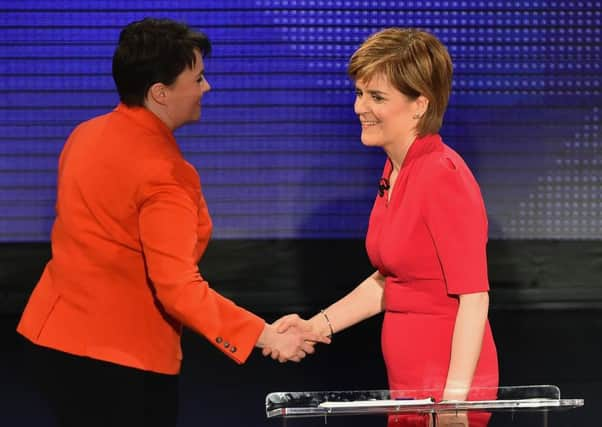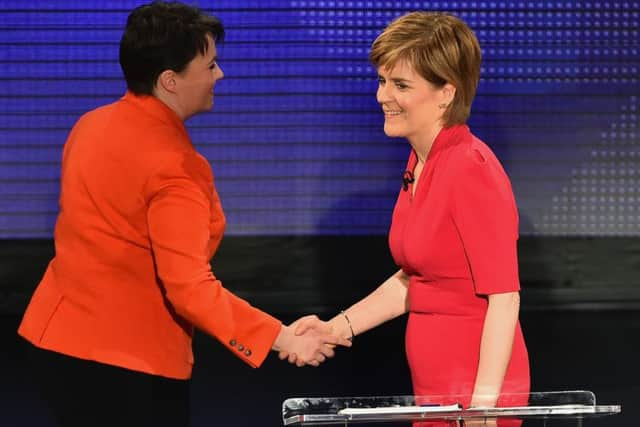Scott Macnab: Focus on indyref2 has proved awkward for SNP


This election has crystallized the divided state of the UK politics like never before. The past month has effectively seen two campaigns being staged north and south of the border. In Scotland the constitution dominates everything. Nicola Sturgeon berates the Tories for focussing their entire efforts on the prospect of a second referendum and how Ruth Davidson will provide strong opposition to this. At the same time, the First Minister unveils her manifesto to the party faithful in Perth yesterday and proclaims that an SNP victory will provide a “triple lock” mandate for another vote on leaving the UK. And of course, it won the loudest and most rapturous applause from supporters.


It’s been a different story south of the border where an intriguing battle between Theresa May and Jeremy Corbyn has seen the embattled Labour leader shake off concerns over his gaffes, competence and even widespread criticism among his own MP colleagues to embark on a near-remarkable recovery in the polls.
Advertisement
Hide AdAdvertisement
Hide AdWhile the Tories suffered a disastrous manifesto launch which saw Mrs May forced into a quickfire retreat on flagship plans for a so-called “dementia tax” which would see some older voters forced to sell their homes to fund personal care, it seems that the more people hear about Labour’s proposals, the more they like them.
This, of course, includes free university tuition which was pioneered by Labour in Scotland, along with the Liberal Democrats before the SNP scrapped all fees when they axed the “back door” graduate endowment.
But this split between the politics of Scotland and the rest of the UK poses a problem for Ms Sturgeon.


It limits her ability to cast herself as a major player on the UK political stage as she did two years ago in the 2015 UK election, when she truly emerged from the shadow of Alex Salmond. Of course, the SNP leader does remain widely recognised as a major political figure not only as Scotland’s First Minister but as leader of the independence campaign in Scotland, which has been among the most fertile political movements in post-war UK politics.
So yesterday’s SNP manifesto launch marked a clear attempt from the SNP leader to get the agenda from her party back on to a UK-wide election footing as she set out an alternative programme to Tory austerity cuts which she branded a “political dogma - an ideology.”
Instead, a £118 billion anti-austerity spending drive was unveiled which would increase the living wage to just over Labour’s £10 an hour, as well as lifting the 1 per cent cap in public sector pay in Scotland, while all further social security cuts would be axed. A raft of Tory cuts including those to Employment and Support Allowance and working age benefits would all be reversed.
Winter fuel payments would not suffer the means testing threatened by the Tories in England, while NHS spending would also be raised south of the border.
And this would all be done while balancing the budget and even reducing UK debt. How?
Advertisement
Hide AdAdvertisement
Hide AdWell, apart from some vague aspirations to boost economic growth, there are proposals to increase the top rate of tax to 50 pence - something which the SNP has shied away from in Scotland for fear it may drive away high earners, It’s perhaps worth pointing out that the last time Labour introduced this policy in England, it only resulted in an extra £10 billion a year being raised.
It seems unlikely this could fund the £118 billion SNP spree unveiled yesterday. In a sense it doesn’t matter, as Ms Sturgeon will never be in any danger of becoming UK Prime Minister and having to implement these policies. But any programme for government that the SNP leader sets out is increasingly measured against the performance of her own party in power. And after more than a decade in office, the sheen is beginning to pall.
Just an hour or so before Ms Sturgeon unveiled her manifesto yesterday, figures published by NHS Scotland’s independent statistics body revealed that the number of patients being treated within the SNP’s flagship - and legally binding - target of 18 weeks had slumped over the past year from about one in five to about one in ten now.
Ms Sturgeon herself has twice endured live television grillings over the state of Scotland’s education system in the past week.
Teachers themselves warned that the system required an overhaul and laid into the under fire Curriculum for Excellence on a BBC Scotland debate last week, while Andrew Neil left the First Minister squirming as he lambasted her over the decline in basic reading and maths standards which has seen the country fall down international educational league tables in recent years.
Another problem for Ms Sturgeon, as with the Prime Minister, is that Brexit has simply not hung over this election as the dominant issue, even though it was ostensibly the reason why Mrs May called the June 8 vote. And that’s played badly for the SNP. The party tends to do well in domestic elections when independence is not an issue.
Even the May 2011 Holyrood election triumph which saw the SNP gain its majority and paved the way for the first referendum was only achieved after a remarkable late shift in the polls which had Labour leading as late as March.
It has limited the Nationalists’ efforts to campaign on the sense of “democratic deficit” which many in Scotland may feel after the country voted overwhelmingly in favour of staying in the EU, but found itself “dragged out” against its will on the strength of votes south of the border.
Advertisement
Hide AdAdvertisement
Hide AdInstead it has been Ruth Davidson’s revitalised Tories who have been able to capitalise on voters perception that her’s is the party which will stand firm on the union, with one poll yesterday indicating that the Tories had risen to 33 per cent, a remarkable turnaround from days of the “nasty party.”
The SNP still looks on course for a resounding victory in Scotland next week. But Ms Sturgeon will lose seats and see her vote share dip from 50 per cent two years ago, which may make the First Minister’s claims of an enhanced mandate for a second referendum difficult to sell to undecided voters.
